Equity & Access Progress, 2018-22

We will continue to engage across campus to ensure that we are providing access and opportunity to all members of the Pitt community.
2018 Pitt Sustainability Plan
- BASIC NEEDS: Strive to create a resource net for incoming students that will allow us to proactively meet our students’ physical, social, financial, and mental health needs.
- PURCHASING: Integrate the tenets of sustainability into the University’s procurement policies and guidelines.
- INVESTING: Form a committee or task force to consider socially responsible investing, to be composed of faculty, staff, student, and administration representatives.
- EQUITY: Work across all impact areas of the Pitt Sustainability Plan to ensure benefits for all within the Pitt community.
Where We Are: Basic Needs
Campus Basic Needs Committee: Established in 2020, the University of Pittsburgh’s Campus Basic Needs Committee was created to understand, communicate, and advocate for students’ basic needs and create resources to ensure student success.
Real College Survey: In Fall 2020, Pitt partnered with the Hope Center for College, Community, and Justice at Temple University to administer the #RealCollege survey. This survey gathers information on the lived experiences of today’s students outside of the classroom. This highly regarded survey is the largest annual assessment of students’ basic needs in the country. Results revealed that 43% of students experience at least one form of basic needs insecurity, and 54% of students experiencing these insecurities didn’t apply to campus support programs because they didn’t know how to. Read Pitt’s full #RealCollege report and find resources that help address basic needs on campus.
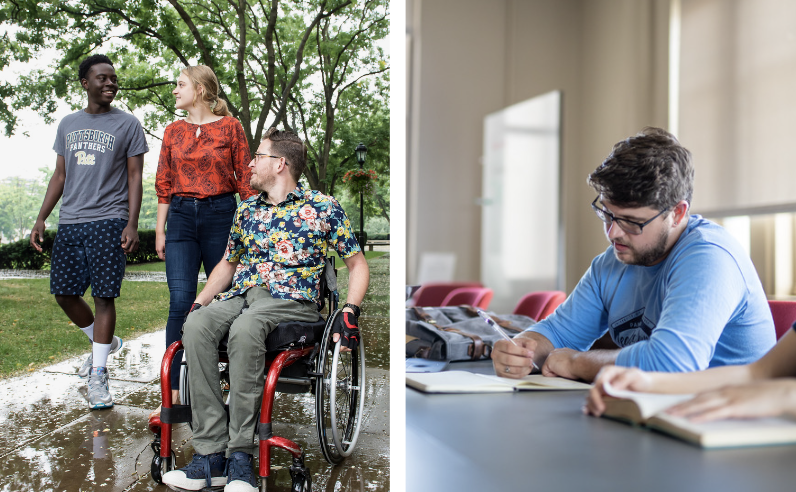
Basic Needs Recommendations: Following on Pitt’s 2020 Real College survey, the Campus Basic Needs Committee made internal recommendations in 2022 that are currently being implemented by Student Affairs’ Wellness team. Authored by cross-departmental Committee members, suggested interventions and opportunities address student needs relating to mental health, food security, housing, employment, childcare, and communications.
Hunger Free Campus: For meeting both basic and innovative steps to address student hunger, Pitt was designated a Pennsylvania Hunger-Free Campus+ in 2023. The designation keeps the University eligible for future grants in addition to its 2023 PA Hunger-Free grant.
Basic Needs Library Guide: In 2017, staff and student leaders from across campus collaborated with the University Library to create a campus-wide basic needs resource guide to be distributed through various student service centers, social media, and newsletters. The guides include Pitt and community-based resources for food, housing, employment, financial security, academic-related expense assistance, and more. Updated in 2018 and 2019 with cross-campus input, the guide’s content is influenced by data from the annual Hope Center for College, Community, and Justice Report, which is used to identify gaps between student needs and resource availability.
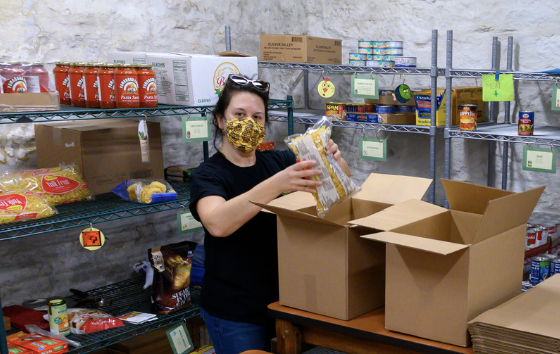
Pitt Pantry: Established in 2015, the Pitt Pantry is a critical part of meeting the Pitt community’s basic needs; its mission is to ensure that all members of the Pitt community have regular access to a balanced and nutritious diet. Newly relocated to the O’Hara Student Center in Fall 2022, the student-run Pantry has served 1,355 visitors between 2018 and 2022. In FY22, the Pantry had 974 visits from 387 shoppers; ~66% of which were graduate students, 31% undergraduates, & 3% staff/faculty.
Emergency Meal Assistance: Created in 2020, Pitt’s emergency meal assistance program offering was critical to helping alleviate food insecurity across campus. In FY22 alone, the program provided over 9,000 meals to 602 students, including $7,500 in external grant support from Greater Pittsburgh Community Food Bank.
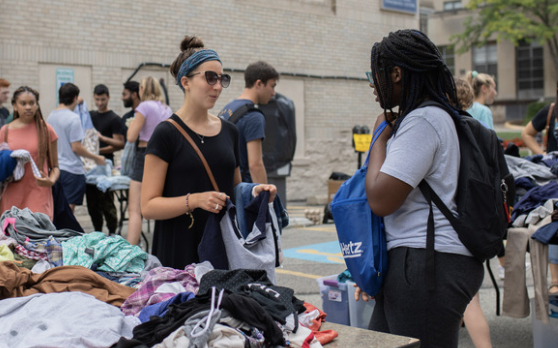
Thriftsburgh Reuse Rummage Sale: Started in 2018, the annual Thriftsburgh Reuse Rummage Sale provides affordable pre-owned clothing, dorm essentials, home goods, and furniture to Pitt students. In Fall 2022, the Thriftsburgh Reuse Rummage Sale had its largest year yet, with 4 days of sales helping rehome 7,160 pounds of items.
Where We Are: Equitable Access
Digital Equity & Accessibility: Adopted in 2020, Pitt’s Electronic & Information Technology Accessibility policy established standards for accessibility in digital environments. As a result, since 2020, Pitt websites have become 25% more accessible, with 63% of all Pitt-hosted websites meeting the industry benchmark for accessibility. Pitt provides courses and resources to help University stakeholders advance University’s accessibly in digital environments and stay up-to-date on technology advances.
Pitt IT is a leader in the University’s efforts to help bridge the digital divide by providing access to affordable broadband, effective technical support, computer skills and digital literacy, and quality computing devices.
In 2022, the Pittsburgh Digital Equity Coalition was named Technic.ly’s “Community Leader of the Year.” The Commission is a collaboration of several organizations seeking to address inequity in technology accessibility through Pittsburgh communities; the University of Pittsburgh is a proud member.

Menstrual Product Access & Reusability: Beginning in 2019, Pitt Planned Parenthood and the Student Office of Sustainability (SOOS) partnered to purchase and distribute 400 reusable menstrual cups and 46 menstrual pads. In addition to avoiding waste, the effort makes reusable menstrual products more visible and financially accessible to students. Continuing to make menstrual products more accessible on-campus, 44 dispensers providing free, single-use period products have been installed across campus from 2019 to present in 17 buildings, including in men’s restrooms in Barco, Towers, and Sutherland.
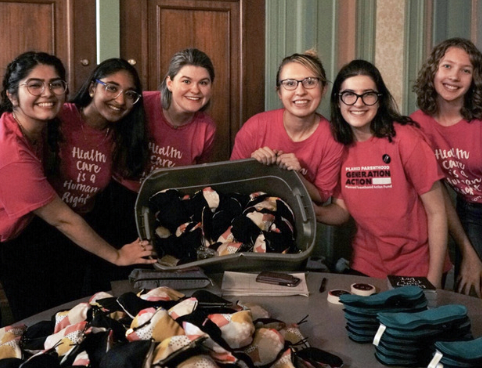
Menstrual Equity: Campus-wide education about menstrual equity is a collaborative effort supported by many student organizations. In 2022, a SOOS-led case study took first place in the 2022 Campus Race to Zero Waste “Education & Awareness” category for student-led menstrual health equity efforts partnered with Pitt EcoReps, Pitt Planned Parenthood, and Free the Planet. The case study describes a Spring 2022 Pitt Zero Waste Period program at Pitt addressing the short- and long-term environmental and health impacts of disposable and reusable products, menstrual health, period poverty, and equity – and distributing reusable products to students.
Pitt’s Days for Girls student organizational chapter of the international nonprofit is working to advance menstrual equality globally through education and sustainable menstrual products. The Pitt chapter focuses fundraising for sustainable feminine hygiene solutions in developing economy countries and education about women’s health on-campus.
Campus Recreation: In 2022, Pitt’s Wellness team reviewed existing facilities to ensure an accessible and inclusive environment. In fitness areas across campus, updated signs and labels promote clean and organized fitness spaces with a more welcoming and inclusive environment in free weight areas. Campus Recreation is also piloting a program for specialized times and fitness spaces for gender neutral and female communities. Signage and wayfinding for gender neutral restrooms in fitness areas is in the process of being updated.

Where We Are: Diverse & Local Purchasing
Diverse & Local Purchasing: Pitt’s historic goal was to purchase 10% of non-construction goods and services from diverse businesses. In 2022, the University exceeded this goal and set a more ambitious target of 15% diverse non-construction procurement by 2025, with a sub-goal of spending 5.5% of non-construction expenses with Black-owned companies by 2025. Previously, the University spent ~2.5% of its annual non-construction dollars with Black-owned companies.
One of Pitt’s largest minority-owned suppliers is SUPRA Office Solutions (a minority-owned business based in Philadelphia) who has partnered with ODP Business Solutions (formerly Office Depot) since 2014. Other key regional minority-owned business suppliers include Zoltun Studios (graphic design), Affordable Linens (special linens and laundering services), and Movin’ on Up Laundry Services (collaborating with Dining).
Where We Are: Environmentally & Socially Responsible Investing
The University of Pittsburgh’ has reviewed and discussed environmental, social, and governance (ESG) considerations for the University’s investments since the1970s, as outlined in the Board of Trustees’ Investment Committee’s governing documents. Since 2018, several University committees and strategies have helped clarify and focus Pitt’s ESG efforts:
2018 – 2019 – Socially Responsible Investment (SRI) Committee of Pitt faculty, staff, and students answered the Chancellor’s charge to explore and report on the potential impacts of SRI strategies on Pitt’s Consolidated Endowment Fund (CEF) investments.
February 2020 – Pitt’s Board of Trustees (BOT) adopted a SRI Screening Process for how the University should consider proposed CEF investment exclusions.
March 2020 – University’s Office of Finance released its ESG Policy for the CEF.
2020 – 2021 – Pitt’s BOT activated the SRI Screening Process and created the 2020-21 Board of Trustees Ad Hoc Committee on Fossil Fuels, whose report on “whether, to what extent, and via what methods the University, in its Endowment, should consider divestment from fossil fuels in existing and/or future investments” was adopted in full by the BOT in February 2021, including the following actions:
- Choose to not apply a negative screen to the CEF with respect to fossil fuels.
- Apply University’s ESG Policy to every investment decision.
- Develop and implement a strategy to seek investments that help reduce, avoid, and eliminate greenhouse emissions.
- Monitor and report on the CEF’s current and projected exposure to fossil fuel investments.
- Publish an annual ESG Report highlighting how ESG has been applied to the CEF while ensuring strong financial returns while updating fossil fuel investments.
2022 – University released its first ESG Report (for fiscal year 2021), hosted on a brand new CEF webpage. In an effort to increase transparency regarding the CEF and application of the ESG policy, enhance awareness about the CEF, and advance dialogue on this important topic, Pitt’s new Chief Investment Officer regularly met with key student leaders and is speaking at various University forums.
2023 – University released its second ESG Report (for fiscal year 2022), including updates on:
- The CEF’s fossil fuel exposure.
- The CEF’s approach to direct engagement with underlying companies in which the endowment holds investments and the use of proxy voting.
- 87% of the CEF’s value is overseen by external investment managers with formal ESG policies or who take ESG considerations into account when making investments.
Pitt does not currently have a separate SRI or ESG Committee. All CEF investment decision-making is governed by the BOT’s Investment Committee (including Trustee members, and faculty, staff, and student representatives) and the Office of Finance.
Where We Are: Sustainability + Diversity, Equity, & Inclusion
Pitt is dedicated to helping build a world-class model of diversity, equity, and inclusion (DEI) defined by inclusive academic excellence and an environment that allows everyone to succeed. Equity is a key pillar of sustainability, and the examples below represent just a few efforts overlapping DEI and Sustainability.
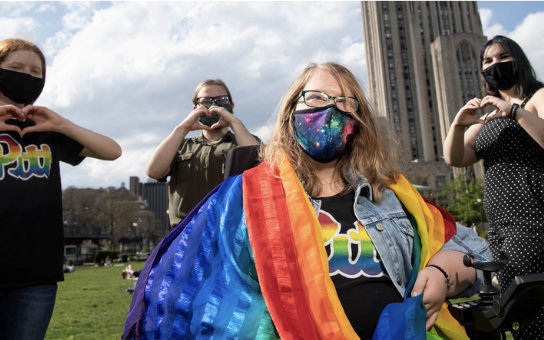
Annual Pitt Diversity Forum: Since 2020, the University of Pittsburgh has hosted a free Diversity Forum that works to equip thousands of participants with the knowledge, skills, and resources to dismantle systems of oppression. The Pitt Sustainability team has worked with OEDI to help curate content and speakers annually focused on environmental justice, climate justice, and equitable communities.

Indigenous Community Collaborations: In September 2022, the University of Pittsburgh hosted its first annual Indigenous Cultural Festival in partnership with the Council of Three Rivers American Indian Center (COTRAIC) and Pittsburgh Parks Conservancy.
This week-long celebration highlighted our region’s indigenous traditions, knowledge, and history.
In 2022, the University also launched its first Indigenous Community Engagement Committee, tasked with helping Pitt become a higher education leader in recognition and inclusion of the diverse and unique histories and cultural identities of indigenous people. While many departments honor indigenous cultures with their own land acknowledgement, an official University of Pittsburgh land acknowledgement is in development in partnership with local indigenous groups.
Where We Are: Environmental Justice
Pennsylvania Environmental Justice Workshops: In April 2021, the University of Pittsburgh supported Urban Kind Institute and Breathe Project in forming the Southwest Environmental Justice Community Hub, which engaged with the Pennsylvania Department of Environmental Protection about regional environmental justice issues and concerns. Pitt helped co-facilitate the “Environmental Justice in Pennsylvania” workshop, which gathered community input to help inform government officials and statewide new policies.
Faculty Environmental Justice Focus: Started in 2021, a Mascaro Center for Sustainable Innovation Faculty Task Force subcommittee focused on environmental justice and how Pitt can engage on this important topic through research and community engagement. The faculty-led group has several educational and research collaborations with Engineering, Geology, History, Public Health, and others. Most recently, the group submitted a training grant proposal on environmental justice that is under review by the National Science Foundation.

CHEER Research: The Center for Healthy Environments and Equity Research (CHEER) is a multidisciplinary, intersectional, and community-based environmental health research program focused on identifying and addressing environmental health disparities, which have a major impact on the health and well-being of individuals and communities. With 2022 Pitt Momentum Funding, CHEER is coordinating faculty, students, and community partners to create research that addresses extensive environmental health disparities across our region, the nation, and beyond.
SOOS Environmental Justice Collective: Created in 2022, the Student Office of Sustainability is working to elevate black, indigenous, and people of color (BIPOC) voices while removing actual and perceived participation barriers in environmental organizations, clubs, and majors. The SOOS EJ Collective is helping raise awareness in the Pitt community about environmental justice issues through partnership with local organizations and educational campaigns.